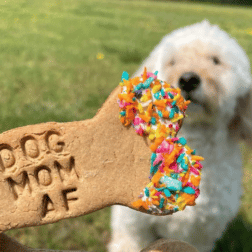Have you ever wondered why your dog cries? This crying, which is more appropriately termed whimpering or whining, is your dog’s way of communicating many different things. There is no exact canine behavior that translates to the type of crying humans do, and dogs do not secrete tears when they are sad. Interpreting a dog’s cry or whine can be difficult, but here are some of the reasons this occurs.

@rumi.vs.the.universe
Why Does My Dog Cry?
@rumi.vs.the.universe

@plotthoundoftheday
Warning: Undefined variable $name in /home/u209698259/domains/dogspotted.com/public_html/wp-content/themes/my-listing-child/functions.php on line 258
your dog May Cry When They Need Something
Many dog parents experience their dog whining prior to going on a walk, playing, or meal time. These sounds are your dog’s way of communicating their need for attention for these things, or they may be anticipating these things if they happen around the same time every day. This is a similar behavior that a puppy will have with their mothers – they may whimper prior to meal time to “ask” for their meal. This whining or whimpering is instinctual, but it is also a learned behavior. Dog’s have the ability to understand that if they whine prior to receiving food, then they may be given a meal or treat every time they whine.
Separation Anxiety
Separation anxiety is a condition that can lead a dog of any age to chronic whimpering. Separation anxiety describes dogs that are usually overly attached to one or more family members. They can show distress behaviors such as vocalization when they are separated from their dog parent. This could mean separation for a few minutes, several hours, or longer. Separation anxiety can be prevented by ensuring that your puppy has adequate socialization and training when it is young. If you adopt an adult dog, then behavioral training with an experienced dog trainer is necessary.

@lord_dinkerton

@bruni_thecorgi
Your Older Dog May Whine Due to Cognitive Dysfunction
Cognitive dysfunction syndrome (CDS) is a neurologic behavior affecting older or geriatric dogs. The closest term for this in humans is dementia. It is characterized by an age-related decline in cognitive abilities including memory, auditory processing, attention, and visual processing. The most common signs of CDS is aimless activity and excess vocalization. CDS is frequently underdiagnosed, and it is important to report any behavior changes to your veterinarian. A medical evaluation performed by your veterinarian can determine if your dog has CDS versus a different reason for their whining.
Warning: Undefined variable $name in /home/u209698259/domains/dogspotted.com/public_html/wp-content/themes/my-listing-child/functions.php on line 258
your dog May be in Pain
Lastly, your dog may whine or whimper when they are in acute (sudden) pain or discomfort. This may be after a surgical procedure, or may be from an undiagnosed underlying condition. One thing to note is that dog’s are very good at pretending or masking their clinical signs of chronic (long-term) pain. A dog with arthritis or with dental disease, may be in constant pain but rarely display their discomfort vocally. A dog on pain medications after a surgical procedure may also whine due to the medication itself, and not necessarily from discomfort. A consultation with your veterinarian is important to rule out an acute or chronic medical issue causing pain, as well as a medication causing whining after surgery.

@lookwhatjensaw
Warning: Undefined variable $name in /home/u209698259/domains/dogspotted.com/public_html/wp-content/themes/my-listing-child/functions.php on line 258
If your dog cries, what methods do you use to soothe your dog? Let us know in the comments below




Conversation